- OT
- Professional support
- AOP
- Optometrist of the Year finalists
AOP Awards
Optometrist of the Year finalists
AOP Optometrist of the Year finalists speak to OT

04 December 2019
Optometrist of the Year finalists in the AOP Awards 2020 share insight on why they became an optometrist and their most memorable moments in practice
Matthew Burford
Domiciliary optometrist Matthew Burford works for the Outside Clinic, which operates nationwide. Mr Burford carries out visits in Worcester and the surrounding area. He also works in a professional services role from the Outside Clinic’s head office in Swindon.
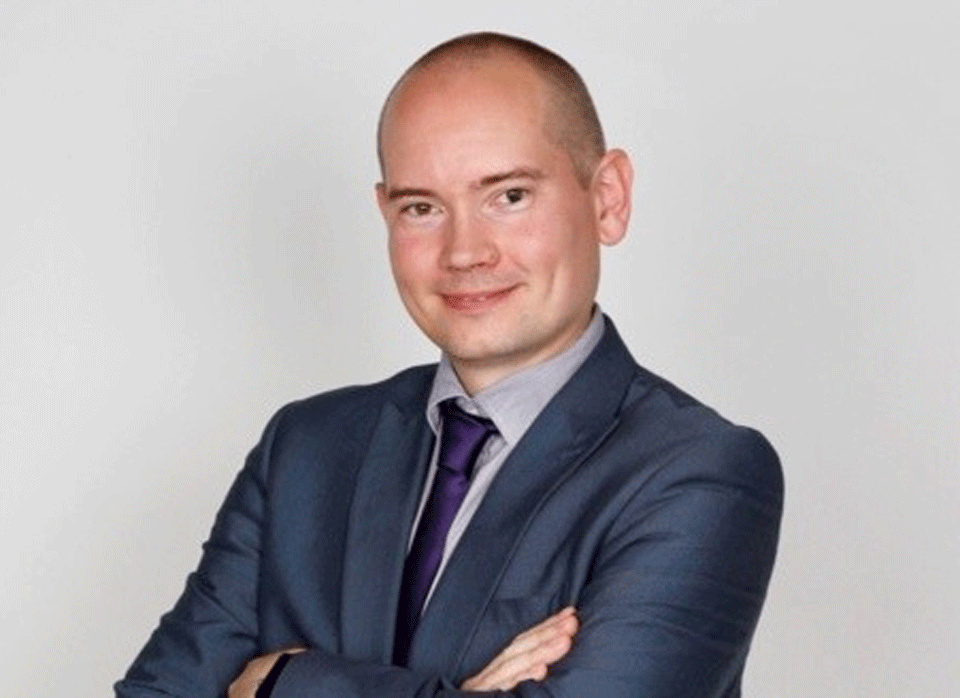
I became an optometrist because I have been very myopic from a young age and vividly remember having my vision corrected for the first time. I can therefore appreciate the impact something seemingly as simple as spectacles can make to quality of life. I wanted to provide this to others.
I love being an optometrist because in the domiciliary sector every day is different and uniquely rewarding; I get to meet some really interesting characters.
For me, great patient care requires the ability to listen, understand and empathise. Put the patient at the centre of your decisions, do your best in each and every situation and you won’t go far wrong.
Being a team player means being flexible, adaptable, reliable and responsible. A bit like being an optometrist.
My most memorable moment in practice has been seeing a man in his 80s who hadn’t had his eyes checked since he was a teen. He was 6/60 uncorrected and accepted his eyesight was failing due to age. However, it turned out he was hyperopic and corrected to 6/6 and n5 right and left; a real “wow” moment.
I love being an optometrist because in the domiciliary sector every day is different and uniquely rewarding
In the future, I predict that optometry will need to adapt to a changing landscape. Technology will become more integrated but patients will always want that human touch. It’s certainly an exciting time to be involved.
Saleel Jivraj
Market Mall Eye Clinic optometrist, Saleel Jivraj, studied for his optometry degree at Aston University before moving to Canada and completing further studies at the University of Waterloo. Dr Jivraj secured his MBA at Aston University in July 2019 and focused his thesis on The Development of Specialist Dry Eye Services in Optometric Practice.
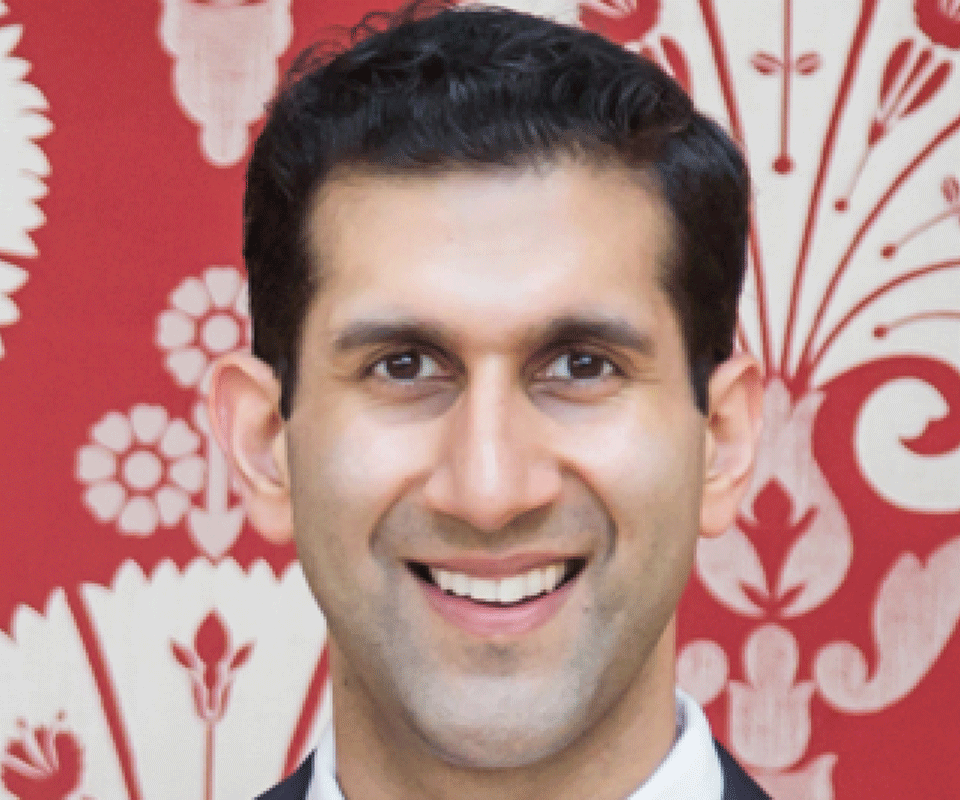
I became an optometrist because I was always fascinated by my own optometrist, who had such passion for what he did and it was infectious. I’m a very high myope and I started wearing glasses at a young age. I went for my first exam as I was complaining that I was unable to see the board at school. He had all these cool tools and toys that he got to play with every day and I wanted to be able to help people see clearly.
I love being an optometrist because of the increase in the scope of practice that optometrists can manage and treat. I love the advancement and development of dry eye research and dry eye treatments that enable us to improve the quality of life for our patients and deliver the highest care to our patients. I love that it is a super advancing and exciting profession to be in.
For me, great patient care requires lifelong learning with a drive for best practice in clinical optometric care and a passion to practice at the highest standard to ensure great patient care.
Being a team player means acting with goodwill and cooperation and continuing to demonstrate resilience in meeting future challenges. A team member means being part of the organisation to continue towards greatness because they have determination, resourcefulness and an inspiring vision of the future.
My most memorable moment in practice has been running my specialist dry eye clinic and seeing improvements in the quality of life for dry eye sufferers. Severe dry eye has been rated as equivalent as angina and dialysis in terms of a patient’s qualify of life and it can be associated with depression. Dry eye can have a huge impact on a patient’s productivity at work. My most memorable moment in practice has been having my patient send me a thank you letter after six months of treatment for her dry eyes. She was so grateful and she was able to have a massive improvement in her quality of life. She was full of energy and filled with joy.
I was always fascinated by my optometrist who had such passion for what he did
In the future, I predict that optometry will be moving towards a medical model. Optometrists will be using advanced technology, such as machine learning and artificial intelligence (AI), to help in the management and treatment of eye diseases. Internet sales, tele-optometry and AI technology is going to have a massive impact in how optometry is practised.
This disruptive technology will shift how optometry is practised, but there will still be a massive need for the services optometrists provide. Optometrists will be in high demand and essential to ensure that we use technology to better patient care and increase access to eye care for all across the globe.
Edward Lyons
Edward Lyons works as an optometrist at Flint and Partners Optometrists; a four-practice independent group based in and around Wolverhampton and Staffordshire.
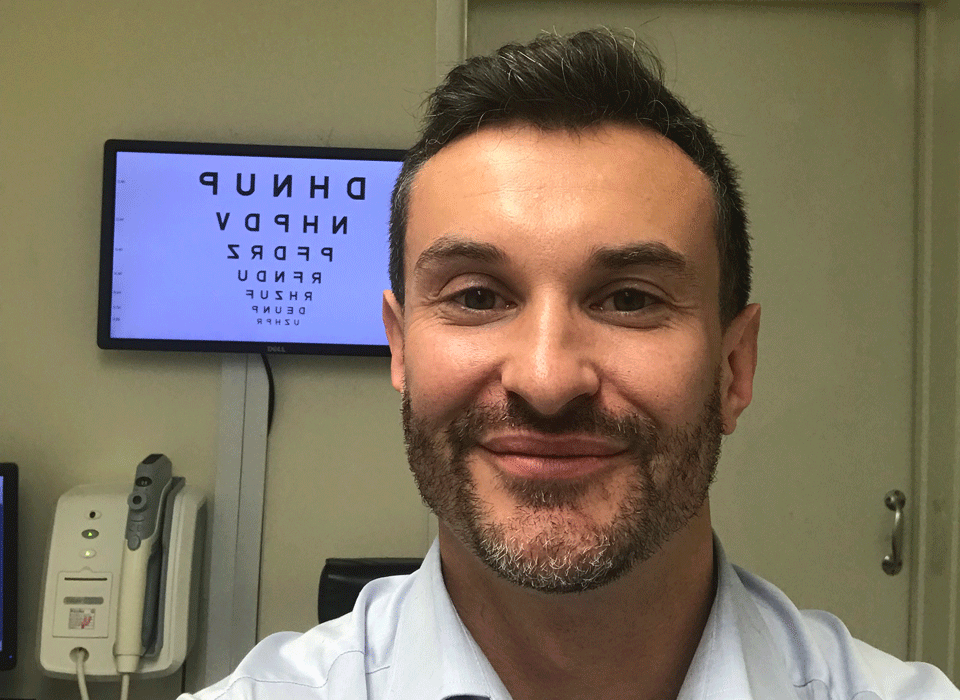
I became an optometrist because I was a myopic child and always found the process of having an eye examination and new glasses to be a very enjoyable experience, which had a tangible effect on how I interacted with the world.
I love being an optometrist because I get to help people on a daily basis live happier, more fulfilling lives. And I help them look good too, which is a bonus.
For me, great patient care requires time, empathy, a good ear and a willingness to step out of your comfort zone as a practitioner.
Being a team player means always being available to help a colleague either face-to-face, over email or on the phone. I’m lucky to work with some great optometrists in my practice and our newly-qualified dispensing optician is a hugely valuable member of my team.
My most memorable moment in practice was approximately 10 years ago, having to resuscitate a patient who had attended for diabetic retinal screening. She stopped breathing but I managed to bring her back round until the first responders came. A few weeks later she called in to say thank you…and to request her prescription to buy her glasses off the internet.
I get to help people on a daily basis live happier, more fulfilling lives
In the future, I predict that optometry will continue to fragment with only specialist independents being able to stand against the corporate giants. Enhancing one’s own clinical skillset is vital.
Jennifer Smith
Lancashire optometrist Jennifer Smith works for Broadhurst Optometrists; an independent with practices in Preston and Lytham St Annes.
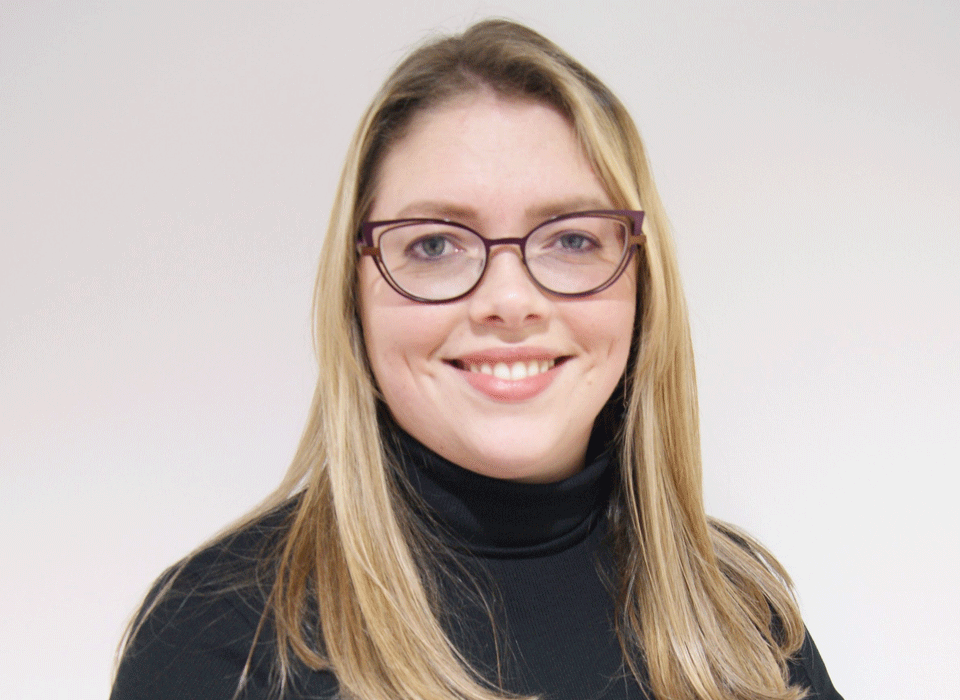
I became an optometrist because I’ve always been a people person. Even as a child, I knew I wanted to work with people and, as I got older, I discovered I had an affinity for the sciences rather than the arts. My mum is a high myope and so from a young age I was taken with my sister for regular sight tests. I still remember getting my first pair of glasses aged seven and being amazed that instead of blurry shapes I could see the leaves appear on trees, the moss and slates on the rooves. After an uninspiring work experience week in a GP surgery, it was my parents who encouraged me at the age of 16 to experience working in an opticians. Safe to say it was much more interesting than my GP experience with all the different equipment and tests. The rest, as they say, is history.
I love being an optometrist because every day is different and is certainly never dull. At the end of each day I can go home knowing that I have made a difference to the lives of the patients I have seen; whether it be better vision, a referral or just some advice. After 12 years working in multiples, I started working for Broadhurst Optometrists in 2017 where I have been lucky enough to fit my work around my family life, spending more time with my husband and two boys.
I have also specialised in one of my passions, contact lenses. I am now one of only a handful of optometrists in my area who work with local hospitals to fit specialised lenses for keratoconus, prosthetic lenses to mask diplopia or trauma and chromagen lenses for colour vision defects. I also run minor eye condition services (MECS), post-cataract, intraocular pressure referral refinement and dry eye clinics, including sac washes and E-Eye treatment.
For me, great patient care requires starting every day with a smile. This helps to create a rapport with my patients. I try to treat every patient as an individual, finding out not only about their visual needs but about their interests. I also take note of important life events such as weddings and birthdays as it shows we really listen and it also helps with subsequent visits. When referring patients or discussing eye health issues, I quite often relate personal stories to make patients feel at ease.
My elderly, technophobe patients are amazed when I tell them my 93-year-old grandma is a dab hand with an iPad; proving it’s never too late to learn. As a mum of two, I also find it easy to build a rapport with children, talking about a recent episode of Paw Patrol can make an eye test much easier.
Being a team player means having the realisation that every member is equally important. I am lucky to work with a fantastic group of people. Whether it’s a personal achievement or a success at work, we are all supportive of each other. On social media we are always creating dedicated posts for each of our successes such as recent graduations. I believe in being open and honest, and pride myself on ‘mucking in’ with any jobs that need doing. It might be helping with the filing, assembling glasses, helping with dispensing or taking out the bins. I pride myself on being reliable too and the team know that if I say I will do something, it will be done. But most of all, we have fun.
My most memorable moment in practice has been diagnosing a large choroidal melanoma earlier this year. The patient affected had no symptoms but at their routine check up I noticed a significant change in a choroidal naevus thanks to our Optomap wide-field camera. I was able to refer them with the images as an emergency to their local hospital. The patient was then sent to the specialist team in Liverpool for plaque radiation therapy.
The patient came into the practice a few weeks ago for a check-up and remarkably has managed to avoid losing the eye and has very little field loss. The hospital also told the patient that if it had been left undiagnosed, it would likely have spread elsewhere with life threatening consequences. This example and other cases only go to highlight how important a regular sight test is.
Being a team player means having the realisation that every member is equally important
In the future, I predict that optometry will possibly divide into optics and healthcare verses dispensing and retail. I would like the profession to be seen by the public in the same way that medicine and dentistry are regarded. Your first port of call for all eye related concerns should be a visit to your optometrist. This work has already begun with the increasing provision of MECS schemes.
However, there are still many patients going to their GP or A&E first. The world of optometry is constantly evolving and being an elected member of the Lancashire and Morecambe Bay Local Optical Committee is allowing me to have a say in what that world will look like. I recently attended the National Optical Conference for the first time and was excited to see the focus is on promoting the profession at a regional and national level within the NHS. This will give optometry a louder voice.
Don Williams
Birmingham optometrist Don Williams is a director at the Edgbaston Eye Clinic and also spends time working for the glaucoma service at the Birmingham and Midland Eye Centre.
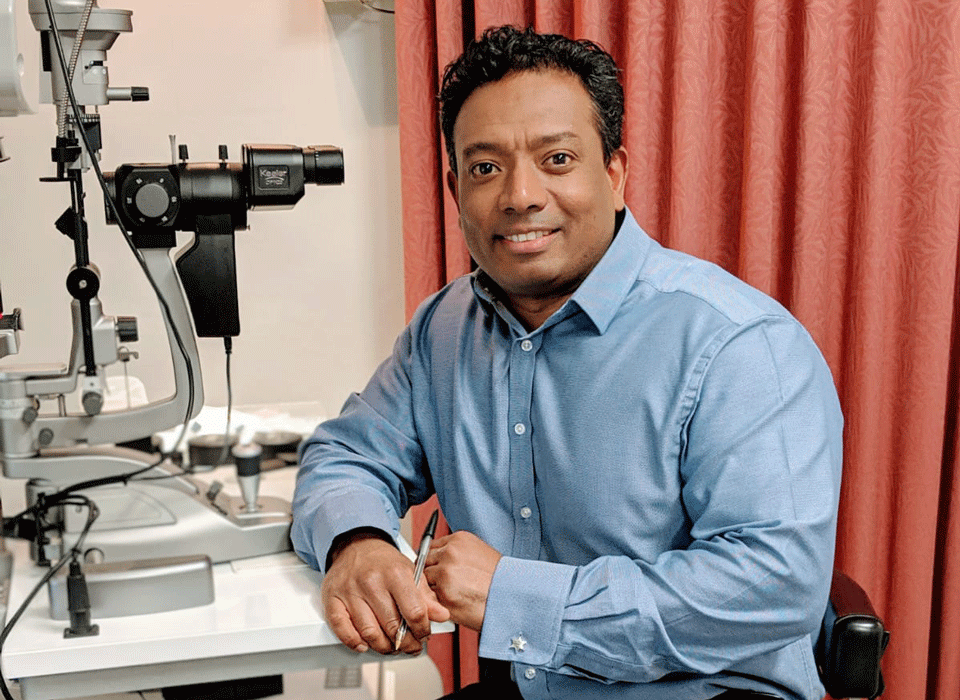
I became an optometrist because I did a degree in applied physics in Paris that involved a lot of optics but I couldn’t find a job after. The closest profession to what I studied was optometry. This has been my best move to date. I did my undergraduate at Aston University and various other postgraduate studies at different universities.
I am still a student. When my little one was four or five, she asked me a question and when I said to her that I am doing my ‘homework,’ she looked at me in disbelief and said, ‘Dad, how come you are doing homework at the age of 40?’ To make matters worse, I got my new student card from the University of Bradford two months ago.
I love being an optometrist because I feel it is a complete role. It is one of the few roles where you can go into management, business, retail, go down the clinical route and even in minor surgical procedures; you can even do all of these. The field of optometry is vast, fun, exciting and the role should be too. I absolutely love it.
I don’t see my chosen career as work. For me, it is a vocation. I don’t have Monday morning blues. When people ask me what work I do, the simple answer is, ‘I don’t work. My job is my hobby.’ There is no starting time and no finishing time.
For me, great patient care requires passion. You need to be enthusiastic about what you do otherwise it makes it meaningless or you will just be ‘working.’
Being a team player means listen to learn and improve rather than go on the defensive. You have to have patience. We are all from different backgrounds and an understanding of your colleague’s culture is paramount. One piece of advice is, ‘If you do not have the qualities to be part of a team then don’t join a team or leave.’ It is as simple as that for me.
My most memorable moments in practice have been numerous. My practice is me, I have no one else. It is me and my room. What is rewarding is when patients show satisfaction and appreciation when a problem is managed or fixed. To me this is very rewarding. I don’t have a time to see patients, the examination takes as long as it takes and patients are happy to pay a premium for that level of service.
I don’t see my chosen career as work. For me, it is a vocation
In the future, I predict that optometry will expand more into the clinical aspect of the profession. I have to say that, as a profession, we have moved forward a lot in diagnostics, contact lenses and dry eye. However, we have been a bit stagnant where clinical work is concerned. I have never believed that MECS should require further training as, honestly, this is what we should be doing in the first place.
This should be our primary role and we should all be competent to provide that level of service after qualifying. To me this shows that we need to up our game and universities need to change certain aspects of the programme to reflect today’s eye care requirements. I know it sounds cliché but we do have an ageing population and people are living longer. I see that with my hospital role. A lot of cases can be managed by optometrists in practice, especially by colleagues registered as independent prescribers (IP). I didn’t realise the importance of being IP-registered until I became one.
The profession is retail-guided by large wealthy companies and a lot of emphasis over the years has been placed on this aspect of the profession. I believe there is definitely more to our chosen profession than this aspect. A lot of colleagues have now got the skillset for giving intra-vitreal injections and some colleagues are involved in certain minor surgical procedures, including laser procedures such as selective laser trabeculoplasty. The future is bright, the role is dynamic and ever-expanding. Optometry is a fantastic career.
Advertisement


Comments (0)
You must be logged in to join the discussion. Log in